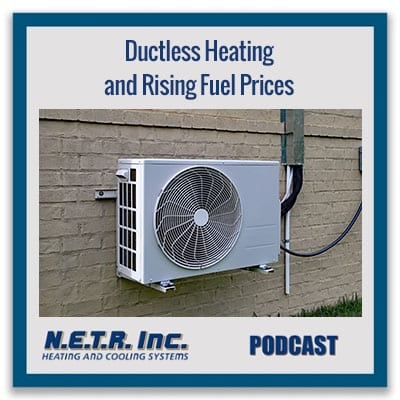
In this podcast, Mike Cappuccio, the founder of N.E.T.R., Inc talks with John Maher about how rising fuel prices affect home heating costs. Then, he explains how ductless heating can help homeowners save money, especially if they are currently using an oil, propane, or natural gas heating solution now.
John Maher: Hi, I’m John Maher. I’m here today with Mike Cappuccio, founder of N.E.T.R., Inc., a heating and cooling company in Massachusetts with a focus on Mitsubishi ductless heating and cooling products. Today, we’re talking about ductless heating and rising fuel prices. Welcome, Mike.
Mike Cappuccio: Good afternoon, John. How are you?
Heating Oil Prices in 2022
John: Good, thanks. So Mike, what’s been happening with oil and propane prices in 2022 that you’ve seen so far?
Mike: Well, John, we’ve all been watching the news, and it’s not good. Oil has definitely gone up in price. If we look at oil last year, home heating oil, I’m going to say, is up about 41% right now. I mean, we were paying basically on the low end last year at this time, around $2.30 per gallon to maybe the high of $4.22. An overall average of what we were seeing was around $2.83 a gallon for home heating oil.
Now today, fast forwarded to March 1, and our average gallon of oil to heat a home is $4.00. It’s as high as $5.21 when the oil man is bringing less than a hundred gallons, they’re usually going to charge more than that. So you’re going to see that price a little bit higher, but on the low end you might see something as low as $3.50. Oil is up around 40% to heat your home right now, along with everything else.
Propane Prices in 2022
John: What about propane?
Mike: Propane is another source that people heat their homes a lot with too. Propane prices are up, but they’re not up as high as oil. The average propane right now is up around 13% from last year. When we look at it, a gallon of propane today, the average price of propane is around $3.81 a gallon. Last year, it was around $3.35 a gallon on average.
Again, anything they’re delivering under 100 gallons is going to be more money. You might see as low as $3.00. You could have seen it as low as $2.40 cents last year. Like I said, propane’s up around 12% to 13%. Oil’s up around 40% to 41% for home heating.
How Does an Air Source Heat Pump Combat Rising Fuel Prices?
John: Wow. Should people consider installing an air source heat pump in order to combat these rising fuel prices?
Mike: Yeah. If I rolled the clock back about four or five years ago, John, when oil was definitely around $2.00 a gallon, $3.00 a gallon, maybe not even as high as $3.00, but we had significantly high oil prices and propane prices. I feel they’re going to keep rising if we don’t do something, but I don’t want this podcast to turn into a political event here.
But with these rising prices… When I rolled the clock back, I can remember we’ve done jobs prior to this where we were installing SOC pumps in a lot of oil and propane heated homes, where we were seeing an average of 50% savings on people’s heating bills. The other thing that they were getting too was air conditioning, because they didn’t have any air conditioning in their homes or they were using window units.
So, they were picking up a savings on their air conditioning bill of around 30 to 40% in the summertime. On average, on the low end, we were seeing 30% savings on heating bills and as high as 50%, but one thing I just want to make people aware of is if you stop comparing that now, it’s not going to look as good because the prices are high, right? You have to consider, look, if my prices were lower, what would my savings be right now? You have to kind of look at, okay, where would my heating bill be?
John: Right. Obviously the higher the fuel prices are the more you stand to gain by switching to something like an air source heat pump.
Other Advantages of Installing Air Source Heat Pumps
Mike: Yeah. Throw into the mix the Mass Save rebates and the 0% financing for seven years that’s going on right now. Also, reducing the carbon footprint as well, and getting rid of these fuels in your home.
John: Right. A lot of people want to do that now.
Mike: Yeah. You can also add an air source water heater in your home too, as well. So, you can heat your hot water with an air source heat pump too. There are water heaters that do that as well. We’re seeing a lot of that going on right now because of these rising costs of fuel. I don’t know if it’s going to go away. It could stay. I mean, I don’t have a crystal ball, but I can tell you what the prices are today. Oil is up 40% and propane’s up 12%.
Rebates for Installing Air Source Heat Pumps
John: Tell me a little bit more about the rebates that are available now for installing an air source heat pump system and how that works.
Mike: With an air source heat pump system, if we were going to say, okay, we have an oil heated home right now, and we want to remove the oil heating system, or we want to disconnect it, or we want to leave it and use it emergencies only, there’s three different ways that the whole home rebate from Mass Save would come into play. It’s a $10,000.00 rebate you’d get on your whole home.
We would need to bring in an energy auditor to look at the home, which we have paired up with another company to help us do that. We have availability in booking their appointments and everything. So, we’d come in, tighten up the home. Weatherization does need to be done. You need to get a certificate of weatherization that your home has been tightened up to get the $10,000.00 rebate. Basically, you’d come in and heat the whole entire home with an air source heat pump.
Even if we put in a 60,000 BTU system, we put in two 30,000 BTU systems in your home, you would apply for the $10,000.00 rebate. The cost of that system, look, I don’t know what it would be. It would depend on the type of installation and the complexity of the job, but you’d be eligible for a $10,000.00 rebate on that coming back from Mass Save. We could also put that in on a 0%, 7-year loan too. All in, if you looked at financing $20,000.00 over seven years, it’s maybe a few hundred dollars a month.
Savings From Switching to Ductless
John: Right, yeah. That could be potentially big savings for people if they’re able to do that.
Mike: Yeah. Yeah. Like I said, we did a lot of this back four or five years ago when oil was up in those prices. I have statistical data on homes where I’ve gone back to homeowners, and done studies, talked to homeowners and compared electric bills to existing oil bills that they had from the prior year. On a bare minimum, we saw a 30% savings at that point on those fuels.
John: All right. Well, that’s really great information. Mike, thanks again for speaking with me today.
Mike: Thanks, John.
Contact N.E.T.R., Inc to Learn More
John: And for more information, you can visit the N.E.T.R. website at netrinc.com or call 781-933-NETR. That’s 781-933-6387.
